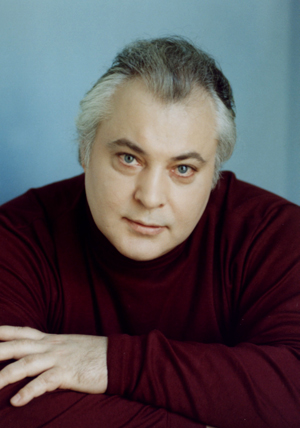

 Nikolai Putilin
Baritone • People’s Artist of Russia • People’s Artist of Tatarstan • Recipient of the State Prize of Russia • Prize-winner at the I International Fyodor Chaliapin Vocalists’ Competition (2nd prize, 1989) • Prize-winner at the International Vocalists’ Competition in Sofia (1988) Nikolai Putilin was born in the Saratov Region. He graduated from the Krasnoyarsk Institute of Arts in 1983 (class of Professor Ioffel). Soloist with the Syktyvkar Musical Theatre (Komi Republic) from 1983–1985. Soloist with the Musa Dzhalil Academic Theatre of Opera and Ballet (Kazan) from 1985–1992. Mariinsky Theatre soloist since 1992. His repertoire includes: Boris Godunov, Shchelkalov, Rangoni (Boris Godunov) Shaklovity (Khovanshchina) Prince Igor (Prince Igor) Demon (The Demon) Eugene Onegin (Eugene Onegin) Mazepa (Mazepa) [Note: The Russians transliterate the name with just one p, so I have used that format throughout. BD] Robert, Ebn-Hakia (Iolanta) Tomsky, Zlatogor (The Queen of Spades) Mizgir (The Snow Maiden) Venetian Merchant (Sadko) Grigory Gryaznoi (The Tsar’s Bride) Fyodor Poyarok (The Legend of the Invisible City of Kitezh and the Maiden Fevronia) the Emperor of China (Le Rossignol) Ruprecht (The Fiery Angel) Tonio (I pagliacci) Nabucco (Nabucco) Amonasro (Aida) Rigoletto (Rigoletto) Giorgio Germont (La traviata) Don Carlo (La forza del destino) Marquis di Posa (Don Carlo) Iago (Otello) Baron Scarpia (Tosca) Valentin (Faust) Escamillo (Carmen) Figaro (Le nozze di Figaro) the Dutchman (Der Fliegende Holländer) Alberich (Das Rheingold, Siegfried, Götterdämmerung) Klingsor (Parsifal) Jokanaan (Salome) the Messenger of the Spirits (Die Frau ohne Schatten) Nikolai Putilin has toured with the Mariinsky Opera Company and independently to Germany, France, Spain, Italy, the Netherlands, Belgium, Finland, Great Britain, Japan, the USA, Hungary, the Czech Republic, Bulgaria, Korea, Israel and Luxemburg. He has performed at renowned opera houses such as the Metropolitan Opera and the Chicago Lyric Opera (USA), the Royal Opera House, Covent Garden (Great Britain), La Scala (Italy) and the Accademia Santa Cecilia in Rome as well as appearing at the Salzburg Festival. The singer’s recordings include The Queen of Spades, Sadko, Iolanta, La forza del destino, Mazepa, Prince Igor and Boris Godunov (Mariinsky Opera Company, Philips Classics and NHK). -- From the website of the
Mariinsky Theater
|
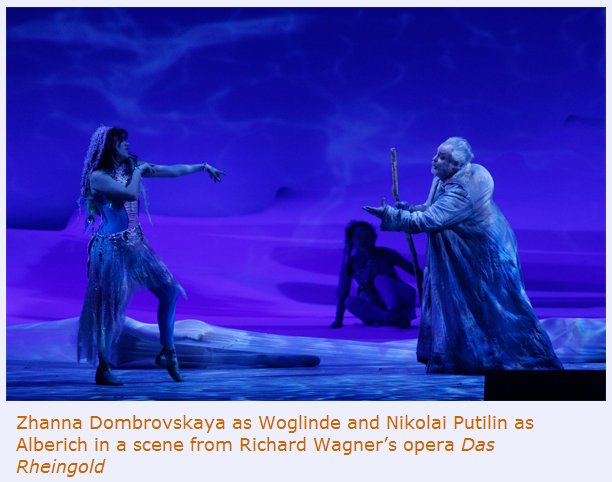 NP: Because of the open vowels
and the sharpness of the sounds. Russian has a very active
articulation and Italian comes more from nature. Now that I have
also sung German repertory, it took me a long time to get used to
it. I sang Jokanaan in Salome,
but when I started doing Flying
Dutchman, that was when I started feeling comfortable with the
German style. It really helps, and I was able to bring that back
to the Italian and Russian repertory. Wagner is a very
interesting composer.
NP: Because of the open vowels
and the sharpness of the sounds. Russian has a very active
articulation and Italian comes more from nature. Now that I have
also sung German repertory, it took me a long time to get used to
it. I sang Jokanaan in Salome,
but when I started doing Flying
Dutchman, that was when I started feeling comfortable with the
German style. It really helps, and I was able to bring that back
to the Italian and Russian repertory. Wagner is a very
interesting composer. 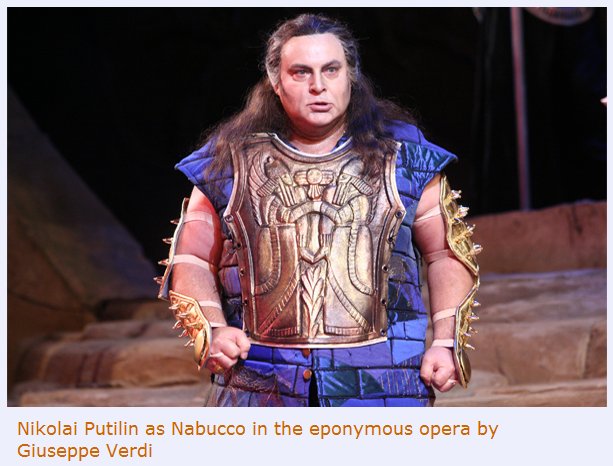 NP: I will go from the
Bible. The redemption comes from repentance. When you
repent, you cleanse. Then you redeem yourself. Every
person, no matter where they stand, high or low, must repent.
NP: I will go from the
Bible. The redemption comes from repentance. When you
repent, you cleanse. Then you redeem yourself. Every
person, no matter where they stand, high or low, must repent.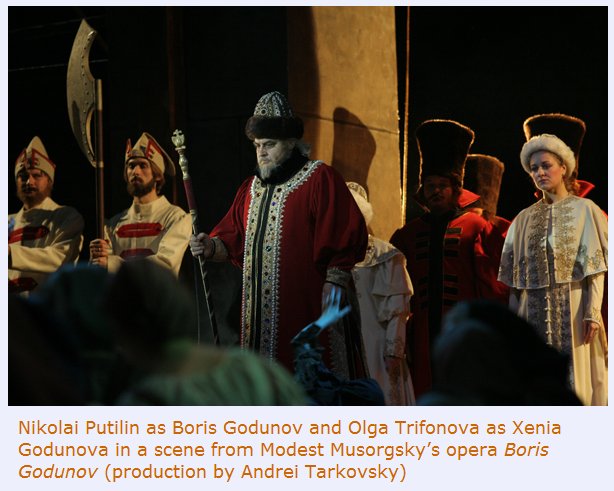 BD: Are you conscious of the
public all the time?
BD: Are you conscious of the
public all the time?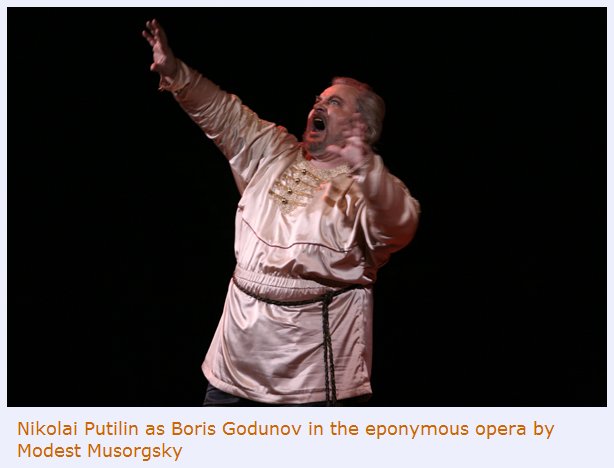 BD: Are there times when you
rely only on feel and not by sound?
BD: Are there times when you
rely only on feel and not by sound?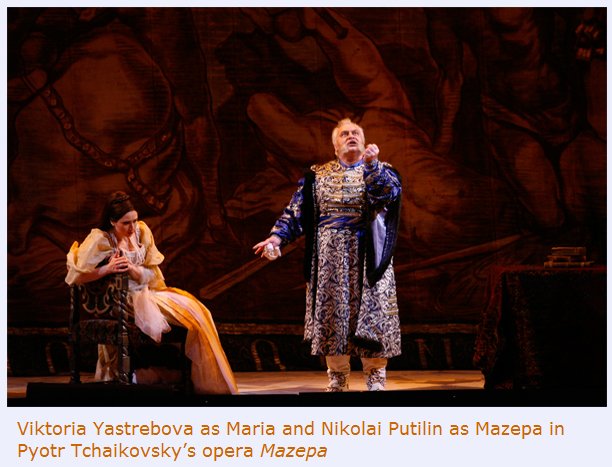 NP: Most characters are
more-faceted. They go and progress. Not the big villians
like Barnaba, Iago, Scarpia. They don't change. They mostly
just carry a certain weight.
NP: Most characters are
more-faceted. They go and progress. Not the big villians
like Barnaba, Iago, Scarpia. They don't change. They mostly
just carry a certain weight.This interview was recorded in a dressing room backstage at
Lyric Opera of Chicago on October 15, 1998. My thanks to Misha
Royzan for providing the translation during the conversation. Portions
(along with recordings) were used on WNIB five weeks later. The
transcription was made and posted on this
website in 2013.
To see a full list (with links) of interviews which have been transcribed and posted on this website, click here.
Award - winning broadcaster Bruce Duffie was with WNIB, Classical 97 in Chicago from 1975 until its final moment as a classical station in February of 2001. His interviews have also appeared in various magazines and journals since 1980, and he now continues his broadcast series on WNUR-FM, as well as on Contemporary Classical Internet Radio.
You are invited to visit his website for more information about his work, including selected transcripts of other interviews, plus a full list of his guests. He would also like to call your attention to the photos and information about his grandfather, who was a pioneer in the automotive field more than a century ago. You may also send him E-Mail with comments, questions and suggestions.